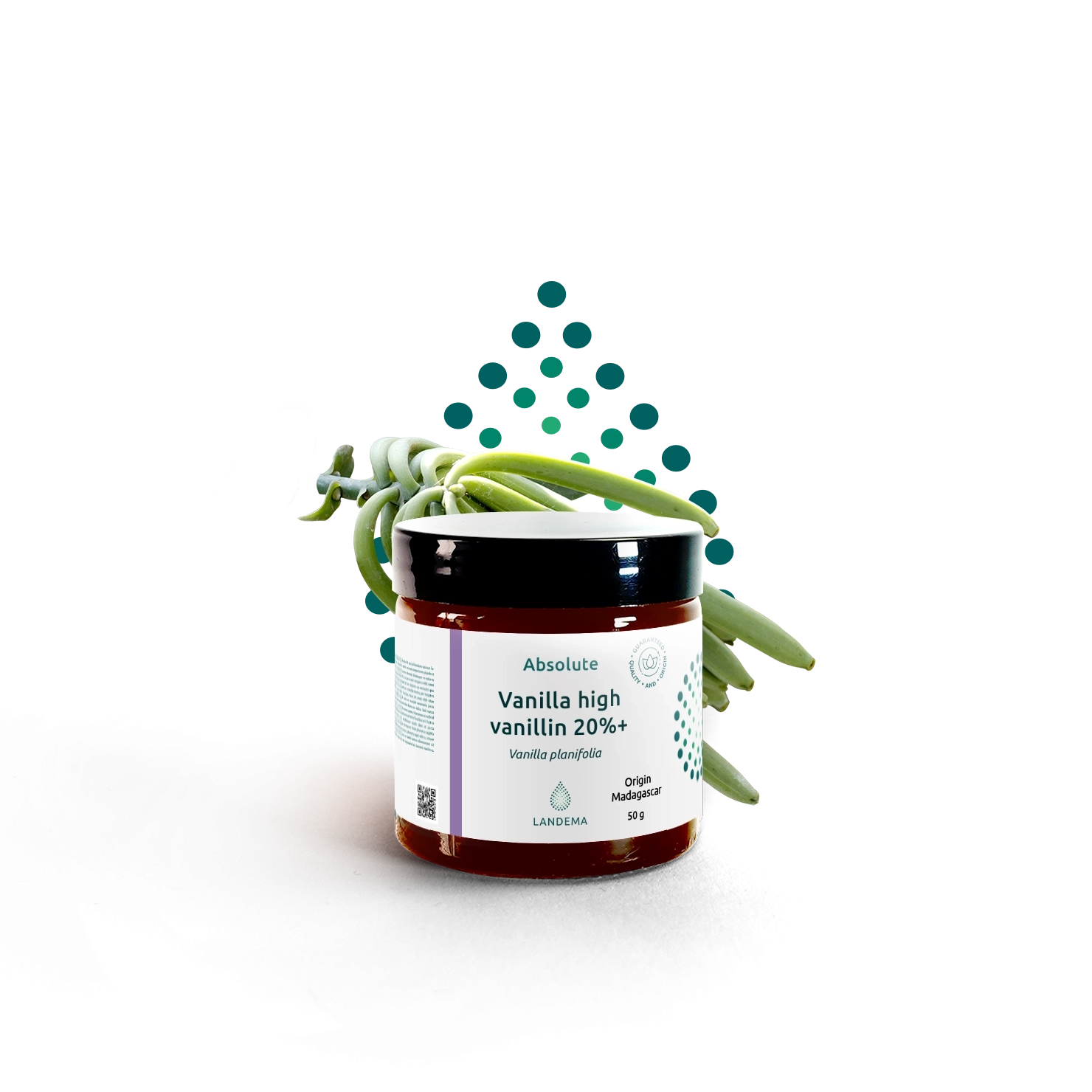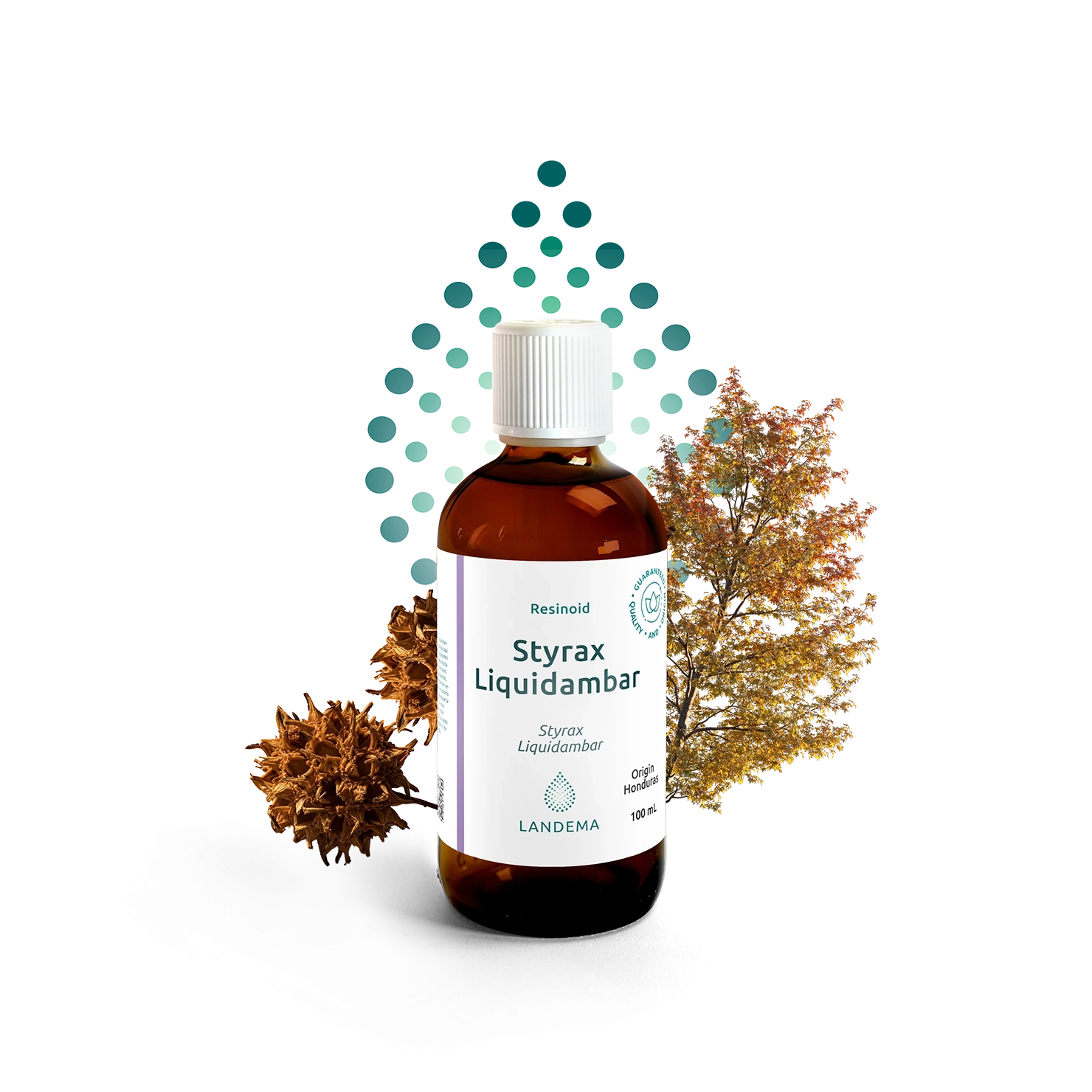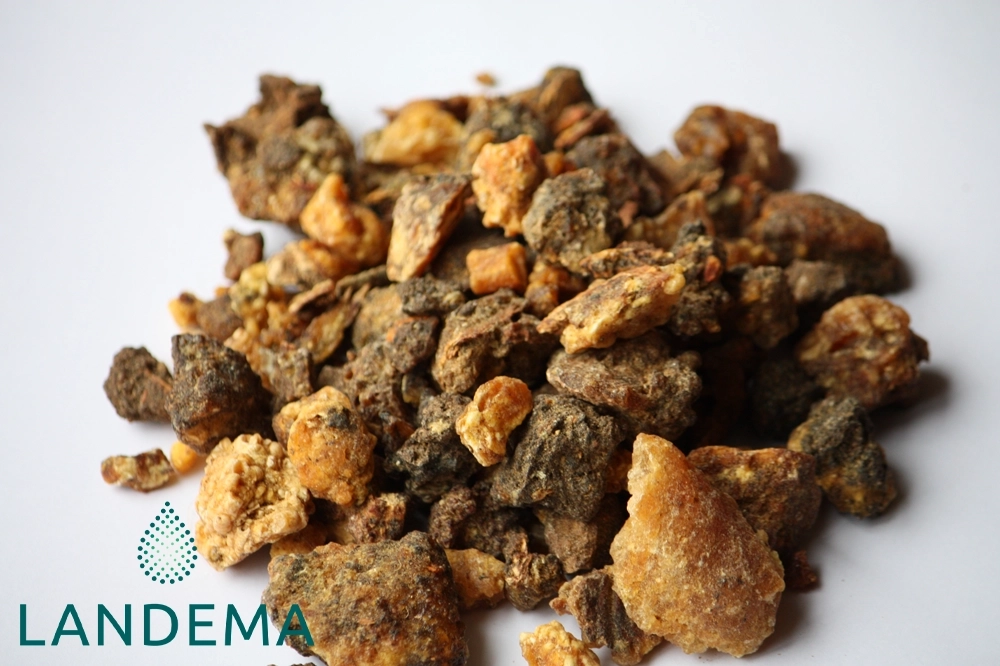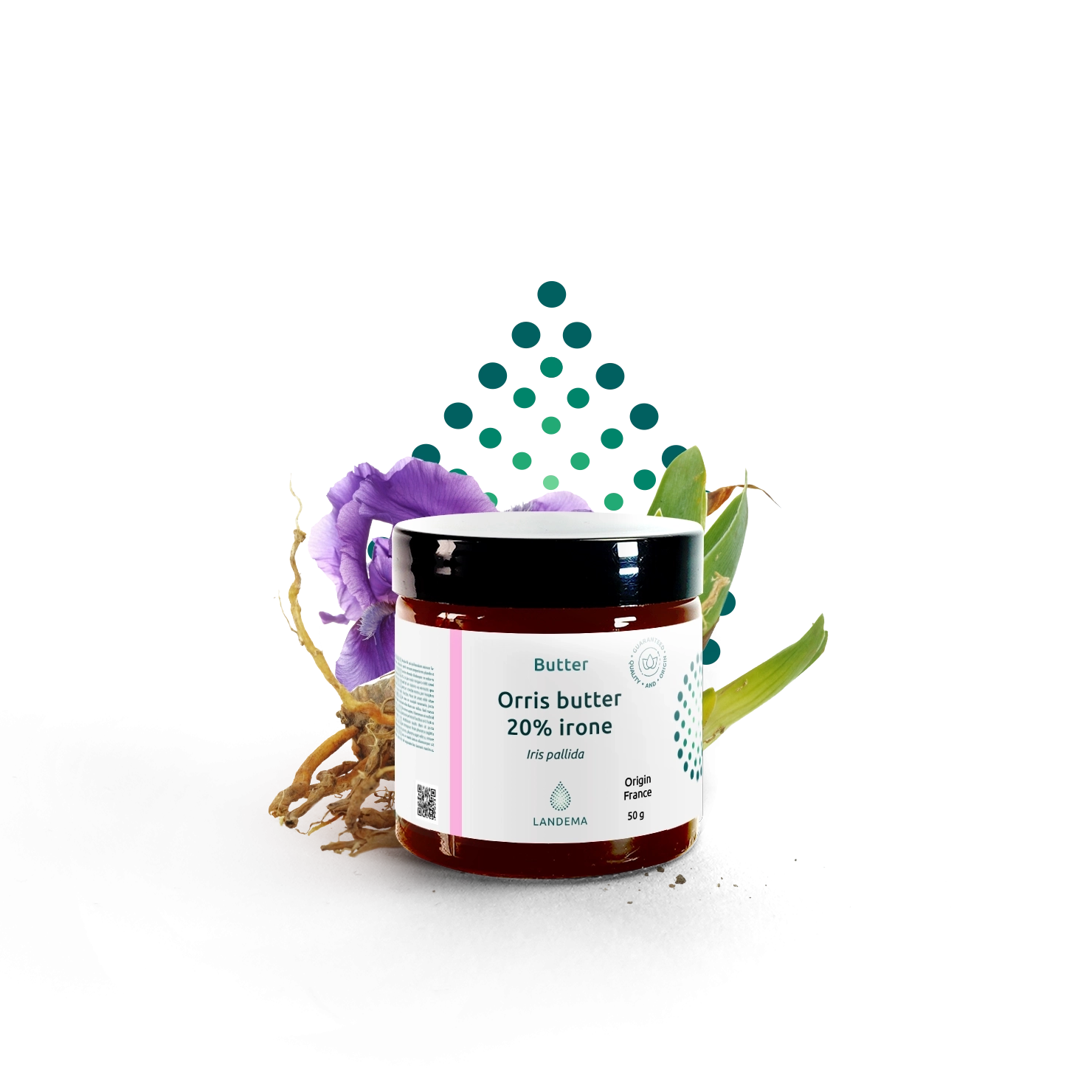.svg)
Agriculture - Gardening
Patchouli ORG
Our organic patchouli essential oil is produced from leaves harvested from our plantation in Ambanja, located in the northwest of Madagascar. Distilled on-site, they yield an intensely woody, earthy, and spicy essence, highly valued in perfumery for structuring oriental, chypre, or amber accords. It blends beautifully with floral materials, precious woods, or leathery notes. Rich in patchoulol, this oil offers a deep and lasting olfactory signature.
Note: For technical reasons, the vial used for the 1mL packaging has a capacity of approximately 4mL, so it is normal for it to appear about one-quarter full. The packaging is carried out using precise and calibrated laboratory equipment.


Native to Southeast Asia, patchouli (Pogostemon cablin) is a tropical herbaceous plant from the Lamiaceae family, valued for its fragrant leaves that contain an essence with woody and earthy tones. Widely cultivated in Indonesia and the Philippines, it is also well adapted to other humid tropical regions.
At Landema, we have developed our own plantation in Ambanja, in the northwest of Madagascar, where the equatorial climate and fertile soils promote organic cultivation. This location allows for direct control of the production chain through our farm and optimal traceability.
Patchouli essential oil is obtained from dried leaves, whose essence content increases after a brief fermentation phase. At our Ambanja site, the production follows these key steps:
Hand harvesting of the patchouli leaves once they have reached full maturity.
Drying the leaves in the shade under sheds to prevent exposure to sunlight.
Steam distillation in stills to extract the concentrated essence.
Separation, filtration, and decantation, ensuring a clear oil, free from sediment or impurities.
Rigorous analytical controls, ensuring compliance with organic specifications.
Patchouli essential oil is an icon in fine perfumery, often used as a base note. Its woody, earthy, dark, and sensual fragrance evokes the damp forest and warm lands. It blends particularly well with:
Oriental, chypre, and amber woody accords, where it enhances longevity and depth.
Rose, vanilla, or musky notes, for a sensual and velvety effect.
Its exceptional persistence makes it an essential ingredient for eaux de parfum, skin perfumes, and high-end scented candles.
In cosmetic care, patchouli essential oil is included for its deep olfactory properties as well as its good skin tolerance when properly diluted.
Frequent applications:
In relaxing massage oils, where it creates an enveloping ambiance.
As an ingredient in nourishing body balms or treatments for mature skin.
In natural soaps or handmade shower gels, for its long-lasting fragrance effects.
Its exotic profile is also appreciated in masculine or unisex product ranges.
Patchouli essential oil is known for its richness in sesquiterpenes and sesquiterpene alcohol, particularly patchoulol, which is responsible for its distinctive fragrance.
Main components:
These molecules are traditionally recognized for their effects in olfaction or in diluted massage.
| Botanical name : | Pogostemon cablin (Blanco) Bentham |
| CAS EINECS : | - |
| CAS TSCA : | 8014-09-3 |
| CE number : | 939-227-3 |
| COE : | 353 |
| Commercial designation : | Patchouli Essential oil Madagascar ORG |
| Composition : | 100% 100% Pure, natural and integral |
| Country of harvest : | MADAGASCAR |
| Country of manufacturing : | MADAGASCAR |
| Declared domestic use : | Ingredient |
| FDA : | 172.510 |
| FEMA GRAS : | 2838 |
| Flash point (°C) : | 116 |
| INCI Cosing : | 100% POGOSTEMON CABLIN LEAF OIL (Syn: POGOSTEMON CABLIN OIL) |
| Internal reference : | B721 |
| Minimum shelf life (month) : | 36 |
| Part of the plant : | Leaf |
| Product's Familly : | PATCHOULI |
| Registered in food inventories : | Yes |
| Regulated sale : | Non |
| Transport Data Dangerous Goods : | 9/III/3082 |
| Type of extract : | Essential oil |
Toxique pour les organismes aquatiques, entraîne des effets néfastes à long terme.
Toxic to aquatic life with long lasting effects.
Peut provoquer une allergie cutanée.
May cause an allergic skin reaction.
Peut être mortel en cas d'ingestion et de pénétration dans les voies respiratoires.
May be fatal if swallowed and enters airways.



Consult our guides: storage and preservation methods and precautions for use
Our organic patchouli essential oil is produced from leaves harvested from our plantation in Ambanja, located in the northwest of Madagascar. Distilled on-site, they yield an intensely woody, earthy, and spicy essence, highly valued in perfumery for structuring oriental, chypre, or amber accords. It blends beautifully with floral materials, precious woods, or leathery notes. Rich in patchoulol, this oil offers a deep and lasting olfactory signature.
Note: For technical reasons, the vial used for the 1mL packaging has a capacity of approximately 4mL, so it is normal for it to appear about one-quarter full. The packaging is carried out using precise and calibrated laboratory equipment.


Native to Southeast Asia, patchouli (Pogostemon cablin) is a tropical herbaceous plant from the Lamiaceae family, valued for its fragrant leaves that contain an essence with woody and earthy tones. Widely cultivated in Indonesia and the Philippines, it is also well adapted to other humid tropical regions.
At Landema, we have developed our own plantation in Ambanja, in the northwest of Madagascar, where the equatorial climate and fertile soils promote organic cultivation. This location allows for direct control of the production chain through our farm and optimal traceability.
Patchouli essential oil is obtained from dried leaves, whose essence content increases after a brief fermentation phase. At our Ambanja site, the production follows these key steps:
Hand harvesting of the patchouli leaves once they have reached full maturity.
Drying the leaves in the shade under sheds to prevent exposure to sunlight.
Steam distillation in stills to extract the concentrated essence.
Separation, filtration, and decantation, ensuring a clear oil, free from sediment or impurities.
Rigorous analytical controls, ensuring compliance with organic specifications.
Patchouli essential oil is an icon in fine perfumery, often used as a base note. Its woody, earthy, dark, and sensual fragrance evokes the damp forest and warm lands. It blends particularly well with:
Oriental, chypre, and amber woody accords, where it enhances longevity and depth.
Rose, vanilla, or musky notes, for a sensual and velvety effect.
Its exceptional persistence makes it an essential ingredient for eaux de parfum, skin perfumes, and high-end scented candles.
In cosmetic care, patchouli essential oil is included for its deep olfactory properties as well as its good skin tolerance when properly diluted.
Frequent applications:
In relaxing massage oils, where it creates an enveloping ambiance.
As an ingredient in nourishing body balms or treatments for mature skin.
In natural soaps or handmade shower gels, for its long-lasting fragrance effects.
Its exotic profile is also appreciated in masculine or unisex product ranges.
Patchouli essential oil is known for its richness in sesquiterpenes and sesquiterpene alcohol, particularly patchoulol, which is responsible for its distinctive fragrance.
Main components:
These molecules are traditionally recognized for their effects in olfaction or in diluted massage.
| Botanical name : | Pogostemon cablin (Blanco) Bentham |
| CAS EINECS : | - |
| CAS TSCA : | 8014-09-3 |
| CE number : | 939-227-3 |
| COE : | 353 |
| Commercial designation : | Patchouli Essential oil Madagascar ORG |
| Composition : | 100% 100% Pure, natural and integral |
| Country of harvest : | MADAGASCAR |
| Country of manufacturing : | MADAGASCAR |
| Declared domestic use : | Ingredient |
| FDA : | 172.510 |
| FEMA GRAS : | 2838 |
| Flash point (°C) : | 116 |
| INCI Cosing : | 100% POGOSTEMON CABLIN LEAF OIL (Syn: POGOSTEMON CABLIN OIL) |
| Internal reference : | B721 |
| Minimum shelf life (month) : | 36 |
| Part of the plant : | Leaf |
| Product's Familly : | PATCHOULI |
| Registered in food inventories : | Yes |
| Regulated sale : | Non |
| Transport Data Dangerous Goods : | 9/III/3082 |
| Type of extract : | Essential oil |
Toxique pour les organismes aquatiques, entraîne des effets néfastes à long terme.
Toxic to aquatic life with long lasting effects.
Peut provoquer une allergie cutanée.
May cause an allergic skin reaction.
Peut être mortel en cas d'ingestion et de pénétration dans les voies respiratoires.
May be fatal if swallowed and enters airways.



Consult our guides: storage and preservation methods and precautions for use

Vanilla high vanillin 20%+
Absolute

Styrax Liquidambar
Resinoid

Opoponax washed resinoïd
Resinoid

Orris butter 20% irone
Butter
Your wishlist
Secure payment

